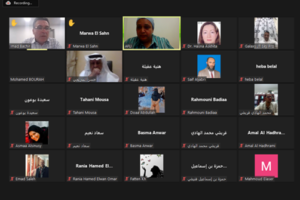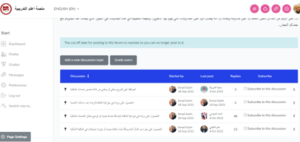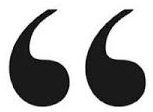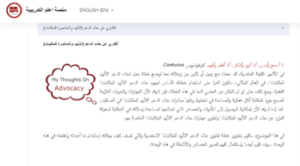IFLA Middle East and North Africa Regional Division completed the first training programme on advocacy
05 febrero 2024
With the successful first round of the Advocacy Training Module held by IFLA’s Middle East and North Africa Regional Division Committee coming to completion in October this year, IFLA’s Middle East and North Africa (MENA) Regional Division Committee (RDC) announced two more rounds of the same module to run in January and May.
The training programme on library advocacy held by IFLA’s MENA RDC in cooperation with the Arab Federation for Libraries and Information (AFLI) was completed in October 2022. 45 participants working in public and university libraries in 17 Arab countries attended the three-month training programme. 19 of them completed it successfully, and will now be ambassadors for the course.

IFLA’s MENA RDC announced that two more training programmes on the same topic will be delivered during 2023. The first one will be launched late January and the second one early May. We asked the course organisers to share more about how they worked:
1. What was the course objective?
Developing librarians’ skills in the Arab countries, which contributes to improving the level of services in libraries throughout the region. Networking among librarians through e-training courses.
2. What was covered in the course?
The course was all about advocacy. The content included topics like: the definition of advocacy; value of libraries; advocacy action plan:
- define your advocacy goals
- define your target audience
- develop your messages to mobilize support
- plan to communicate your messages effectively
- identify potential partners
- build your team
- complete your advocacy plan
The content used was the translated in Arabic version of the module created by the International Network of Library Innovators (INELI) programme, as developed by Global Libraries and the Bill and Melinda Gates Foundation.
 3. How was the course delivered?
3. How was the course delivered?
The course was on a self-learning mode. It was provided online via the Arab Federation for Libraries and Information Moodle open-source learning platform (ineli-mena.org/lms/) and lasted for almost three months. The platform was open to be used by the participants anytime during this period.
4. Where did the participants come from?
Participants came from 17 Arab countries: Egypt, Tunisia, Algeria, Morocco, Palestine, Emirates, Sudan, Libya, Lebanon, Jordan, Iraq, Syria, Saudi Arabia, Oman, Kuwait, Yemen.
5. Who were the instructors?
Prof. Emad Saleh, the prior vice president of the Arab Federation for Libraries & Information (AFLI) was the learning coordinator and he was responsible for creating the content. Heba Mohamed Ismail and Badiaa Rahmoni, IFLA MENA RDC members, and Doaa Abdallah (volunteer from AFLI) worked as facilitators for the participants and helped them with the content and reviewing their assignments.
6. What was the impact on participants?
Participants gained new skills to advocate for their libraries. Most of the feedback received from the trainees indicated that participants now seem more determined to go forward and apply their action plans. See also below testimonials from participants for more.
7. How could someone get involved in the next round of participants?
Keep an eye on this space, as IFLA’s MENA RDC is going to announce a call for applications from librarians in the MENA region to take part in the next advocacy courses in January and April. Follow IFLA’s MENA RDC mailing list, the IFLA-L mailing list, as well as AFLI announcements on social media and the AFLI website. There will be announcements published there.
8. Who are the contact persons to ask more about this?
Heba Mohamed Ismail & Badiaa Ramouni (IFLA MENA RDC). Find their email addresses here.
Testimonials from the programme coordinators

Heba Ismail It was great to see the partnership between AFLI and IFLA MENA RDC. This partnership enabled us to provide the participants with adequate and sufficient training, and brought experts that facilitates this training to participants.
Badiaa Rahmoni The training course was an opportunity to enable library and information professionals have greater self-confidence. This advocacy training was successful also because it was supportive of IFLA’s vision in spreading the culture of advocacy in Arab libraries.
Doaa Abdallah The training course on advocacy was a wonderful experience in following and directing a distinguished group of specialists in libraries and information in the Arab world with different experiences. One of the greatest experiences and results was training them to prepare complete, effective and realistic advocacy plans and how to use advocacy tools. Using advocacy tools ensures that their issues are widely disseminated so that they can reach stakeholders and decision makers, achieve their advocacy goals, and support their libraries. The training was interactive and it was noticed that the trainees’ skills improved gradually.
Testimonials from participants

Muhammad Al-Agha We learned how to harness all capabilities in advocacy through different methods that we were not aware of before, and that libraries can be developed and enhanced through making possible advocacy efforts. The most interesting topic in advocacy for me is identifying the target audience.
Amal Ahmed Al Hadhrami This course was actually very useful by getting to know the advocacy process, as it was the first time for me to know about it, and the most interesting and important thing was defining the goals and objectives of advocacy.
Amin Al-Dheeb In general, all the topics and activities were enjoyable, especially the advocacy forum (advocacy for libraries) in your library, which was the starting point towards preparing the advocacy action plan. Through it, many goals can be achieved that are reflected in our practical life.
Basma Anwar Al-Mashwah The topic is new to me. The most interesting topic is the value of the library, responding to colleagues in the forums, sharing ideas and the whole module is new. In my opinion, we as librarians must be familiar with everything related to library and information science studies.
Ali Taadi Perhaps the issue of advocacy is of great importance because of its results in the long and medium term, which are beneficial to the majority of libraries.
Rania Hamed Accessing the educational platforms is a unique experience because this is the first time for me. I benefit from the experiences of the programme staff; colleagues from Arab countries; the forums, reviewing advocacy ideas with my colleagues in the profession; and preparing an advocacy plan.
Heba Bilal Forming a team and setting priorities and goals are the most important things I learned from this module. The most interesting topic is the sense of goals of the advocacy plan and the team spirit in providing the required support and assistance. I found it difficult to deal with the numbers and statistics, but the team members provided the necessary support, by clarifying their importance to changing behavior. I suggest that libraries and institutions should nominate participants for this training.
Faten Khadrshah The most interesting and important topic for me was defining your advocacy goals and objectives. The information was very rich.
Khaleda Osman This is considered one of the difficult modules that require high concentration and strong motivation, and I learned a lot from it. I learned that the value of the library is in the programs and activities it offers and the community it serves. The most important topic for me is delivering your messages and your library story effectively. All the information seems appropriate for my work and I benefit from it.
Hania Aqeela This module was of great importance to me, because I was able to understand many vague and unclear matters, such as defining the goal of advocacy, developing a plan within criteria, standards and methods, and collecting the information and tools that we will need to develop the advocacy plan. In this module, I also learned how to use social media efficiently.
Qureshi Muhammad Al-Hadi The experience of advocacy was unique, as it cultivated in us a kind of responsibility and good interest in performing a noble message aimed at achieving the goals and mission of the library. I learned many positive points about the library and the necessary services that it needs based on the support of the users and the strong will that was planted in us, and this is through the advocacy action plan that we prepared in a sequence.
Suad Naim From this module I learned how to accomplish a specific work or goal in my library, how to develop a specific plan, how to deal with decision makers and persuade them to agree to establish a new library. The most interesting topic is defining the target audience and developing advocacy messages and plans to deliver your messages effectively. Yes, there are some topics suitable for my work in the library, like social media and library media.
Hamdini Nordin In this module, I learned about advocacy, its success and application, its goals and objectives, the messages supporting it, target audience, the importance of partners in achieving the goals of advocacy, and all topics of importance and benefit to us, because advocacy requires the involvement of all the elements mentioned. All information is appropriate in my work and life. I will implement my plan and demand funding to achieve my goal of mobilizing support and advocacy for libraries.
Read more about IFLA’s Middle East and North Africa Regional Division Committee, their news, events and plans: ifla.org/units/middle-east-and-north-africa-regional-division.
